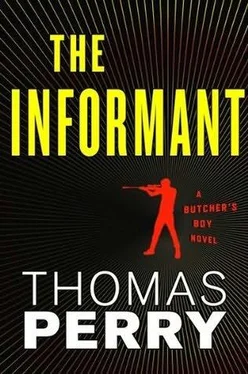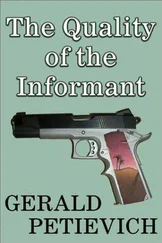Thomas Perry - The Informant
Здесь есть возможность читать онлайн «Thomas Perry - The Informant» весь текст электронной книги совершенно бесплатно (целиком полную версию без сокращений). В некоторых случаях можно слушать аудио, скачать через торрент в формате fb2 и присутствует краткое содержание. Жанр: Триллер, на английском языке. Описание произведения, (предисловие) а так же отзывы посетителей доступны на портале библиотеки ЛибКат.
- Название:The Informant
- Автор:
- Жанр:
- Год:неизвестен
- ISBN:нет данных
- Рейтинг книги:5 / 5. Голосов: 1
-
Избранное:Добавить в избранное
- Отзывы:
-
Ваша оценка:
- 100
- 1
- 2
- 3
- 4
- 5
The Informant: краткое содержание, описание и аннотация
Предлагаем к чтению аннотацию, описание, краткое содержание или предисловие (зависит от того, что написал сам автор книги «The Informant»). Если вы не нашли необходимую информацию о книге — напишите в комментариях, мы постараемся отыскать её.
The Informant — читать онлайн бесплатно полную книгу (весь текст) целиком
Ниже представлен текст книги, разбитый по страницам. Система сохранения места последней прочитанной страницы, позволяет с удобством читать онлайн бесплатно книгу «The Informant», без необходимости каждый раз заново искать на чём Вы остановились. Поставьте закладку, и сможете в любой момент перейти на страницу, на которой закончили чтение.
Интервал:
Закладка:
There were hundreds of articles, but they told him virtually nothing. Some guy in California was denied a liquor license because he had been seen with members of the Balacontano family. A few basketball players who were apparently well known were under investigation because their favorite strip club was owned by a Balacontano soldier and their bills were comped. There were investigative reports about companies in the trash-hauling business, the linen-supply business, investment banking, sports, music. There was even one on the link between the Balacontanos and a company that ran prisons in Midwestern states. The search engines picked up anything with the right key words in it. Apparently there were Balacontanos who had nothing to do with the crime family, and the Internet picked up every time one of their kids pitched in a high school game, got married, or got promoted. He left the laptop plugged in to charge the battery while he lay on the bed, looked up at the ceiling, and considered.
He wasn't certain where Frank Tosca had gone, but his best guess was that he had taken his family to Canada, to the house he owned on the north shore of the St. Lawrence River. He might have noticed all the surveillance teams outside his house on Long Island and figured a good way to stop the clock on any federal proceedings against him would be to go to Canada for a while. He had owned the house on the river for a long time and could hardly be accused of fleeing the country to avoid prosecution.
Over the years in England, Schaeffer had kept renewing his U.S. passports in the names Michael Schaeffer and Charles F. Ackerman. He chose the Ackerman passport for this crossing because he didn't want to compromise the Schaeffer identity. He decided to take some minor precautions with the two pistols he had taken from Tosca's soldiers. First he drove to a sporting-goods store and shopped for something that was the right size and shape. He settled on a tennis net that had posts at either end that could be sunk into holes in a court. They were essentially two three-inch steel pipes with caps at the upper ends and plugs at the lower. He brought the set back to his hotel and opened the lower ends of the pipes.
The two pistols he dismantled on the bed. He slid the slides, springs, barrels, triggers, sears, handgrips, and magazines into the two pipes, then plugged the pipes again. That left the two flat steel pistol frames, which he placed on the floor of his car on the driver's side under the floor mat.
Two hours later, at seven in the evening, he was crossing the Rainbow Bridge over the wide, blue Niagara toward Niagara Falls, Ontario, with the daily caravan of Americans coming over the river to leave their money on the green felt tables of the casinos. He could see the incongruous new additions to the staid architecture he remembered from the time before he'd gone to England. The colored lights looked as though a small part of Las Vegas had been brought here and planted. When he got to the end of the bridge, the Canadian customs woman looked at him and barely focused her eyes on his passport, handed it back, then waved him into Canada.
He drove east on the Queen Elizabeth Way along Lake Ontario toward the St. Lawrence. As he approached Toronto, night was falling, and he was once again on a dark highway that could have been anywhere on the continent. He could remember clearly the only time he had been to Tosca's summer house. It had been a hot summer day, and they had come over the bridge at Alexandria Bay and entered Canada east of Gananoque. The house was on a narrow, pebbly beach, one of a stretch of houses that were not the usual small, wooden buildings that were everywhere on the Canadian side of the river and the Great Lakes. These belonged to prosperous people from Toronto, Ottawa, and Montreal, and they were as substantial as their houses in the city. Tosca's was made of brick, had two stories, a garage, a brick patio, and a boathouse with a ramp like a little railway to let the boat glide down over the pebbly beach into the water just beyond the shallows. Once the boat was in the water, four of Tosca's men would remove the ramp in sections, then put it back in when they were ready to take the boat back to its boathouse.
He stopped a few miles past Toronto to eat dinner. He liked to travel later at night, when traffic would thin out and little about him was visible. When he came out to the parking lot, it was full night. The sun had gone down an hour ago somewhere off in the direction of Cleveland. The diners all seemed to like to park in the lighted area near the door of the restaurant, so no one was near him in the back of the darkened lot. He opened the trunk of his car, took out his two metal posts, and brought them with him into the car. He emptied the posts onto the front seat, retrieved the frames from the floor near the gas pedal and the brake, and arranged the parts of his two guns for assembly.
The exercise brought him back again to his adolescence with Eddie Mastrewski. Eddie had been in the army, and he had been taught to fieldstrip and reassemble his rifle blindfolded. He had felt that blindfolded stripping and reassembling weapons was so valuable that he would always insist the boy do the same with whatever weapon he would be using on the next job. He had started him with a heavy Springfield Model 1911-A1. 45 automatic that was too big for his hand. The boy had protested that the whole idea was stupid, as everything teenagers didn't want to do was stupid. But after two hours of practice, he could accomplish the task quickly and efficiently. The next weapon was easier, and the one after that more so, and soon his hands were familiar with all of the minor differences between the common makes and models, the variations each company made in its products. He never forgot. As he assembled the guns tonight, he could practically see every part in the dark with his hands.
At midnight he reached the house. He went past it and drove a half mile farther down the road to an apartment complex that had not been there, could not have been there, in the old days. He parked in a space behind the building that was stenciled VISITOR, and walked back along the beach to Tosca's house. He stayed on the hard, wet stones along the line where the gentle waves sloshed in, not higher on the shore where there might be dirt that would hold his footprints.
He almost smiled. There was a light on downstairs. Someone was here. He stood still on the beach beyond the place where the glow could reach him and watched the windows. He reminded himself that he had a decision to make: Tosca was probably here, but if he was, his family could be here too. He didn't relish the idea of killing women and children, but leaving a witness alive would be insane. As he stared in the windows, he thought about it. He didn't see them. Maybe they were upstairs asleep, and he could do Tosca downstairs without waking them. He thought some more. Tosca had made a choice when he had sent his men to England to kill him. It had been Tosca's responsibility to remember he had a wife and children before he had done that.
He moved closer to the house. There were windows open on the river side of the house, with no protection except the screens. He understood the impulse. When a building on the shore had been closed for a while, the damp air seemed to find its way in through invisible cracks, or maybe moisture just precipitated out of the air trapped inside. The first thing people did was fling open the windows and let the fresh, sweet air from the water blow in and clear out the musty smells. All he could see from this window was an empty alcove. Beyond it was the dining room, furnished with fake-crude country-style furniture, half-lighted by the glow from a light in the living room.
He made a small incision in the window screen to the left, because the light from the next room was brighter on the right. He pushed the blade in, unhooked the screen, then pulled it outward and climbed in the window.
Читать дальшеИнтервал:
Закладка:
Похожие книги на «The Informant»
Представляем Вашему вниманию похожие книги на «The Informant» списком для выбора. Мы отобрали схожую по названию и смыслу литературу в надежде предоставить читателям больше вариантов отыскать новые, интересные, ещё непрочитанные произведения.
Обсуждение, отзывы о книге «The Informant» и просто собственные мнения читателей. Оставьте ваши комментарии, напишите, что Вы думаете о произведении, его смысле или главных героях. Укажите что конкретно понравилось, а что нет, и почему Вы так считаете.












